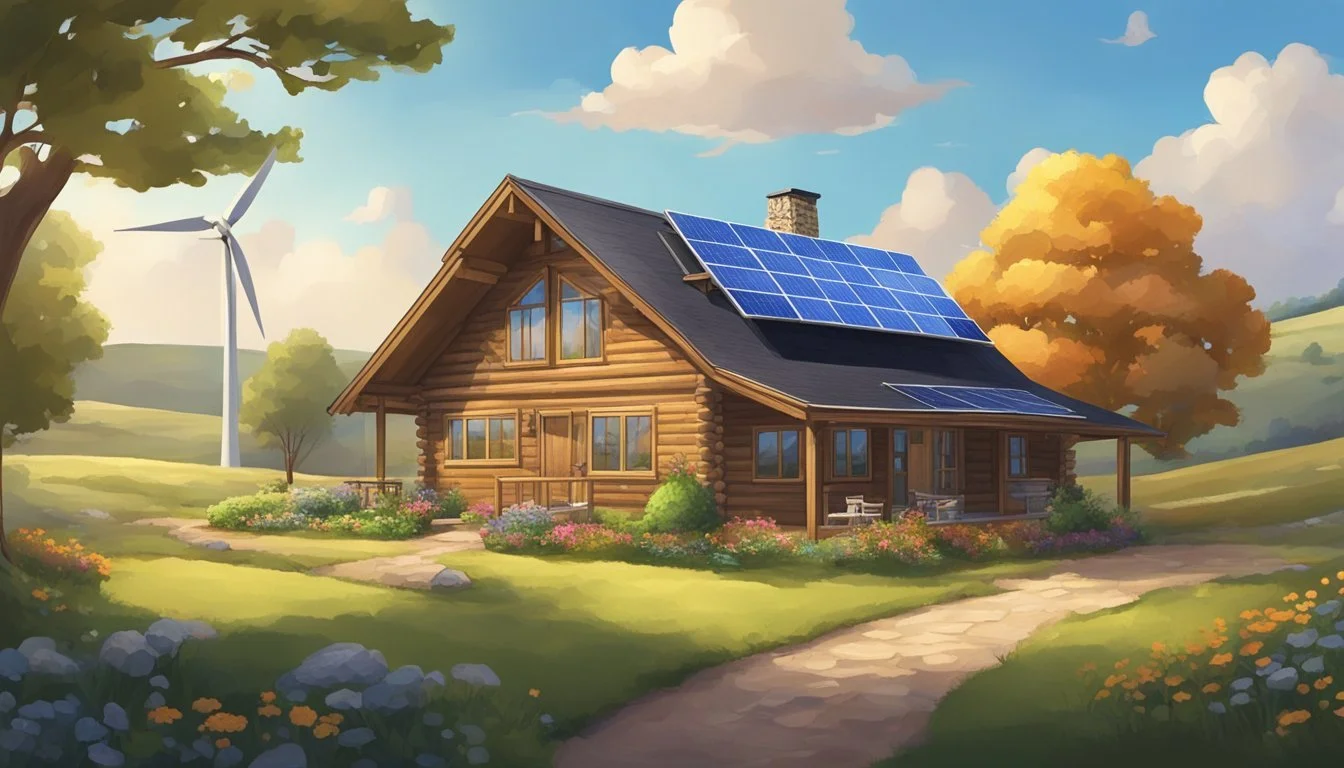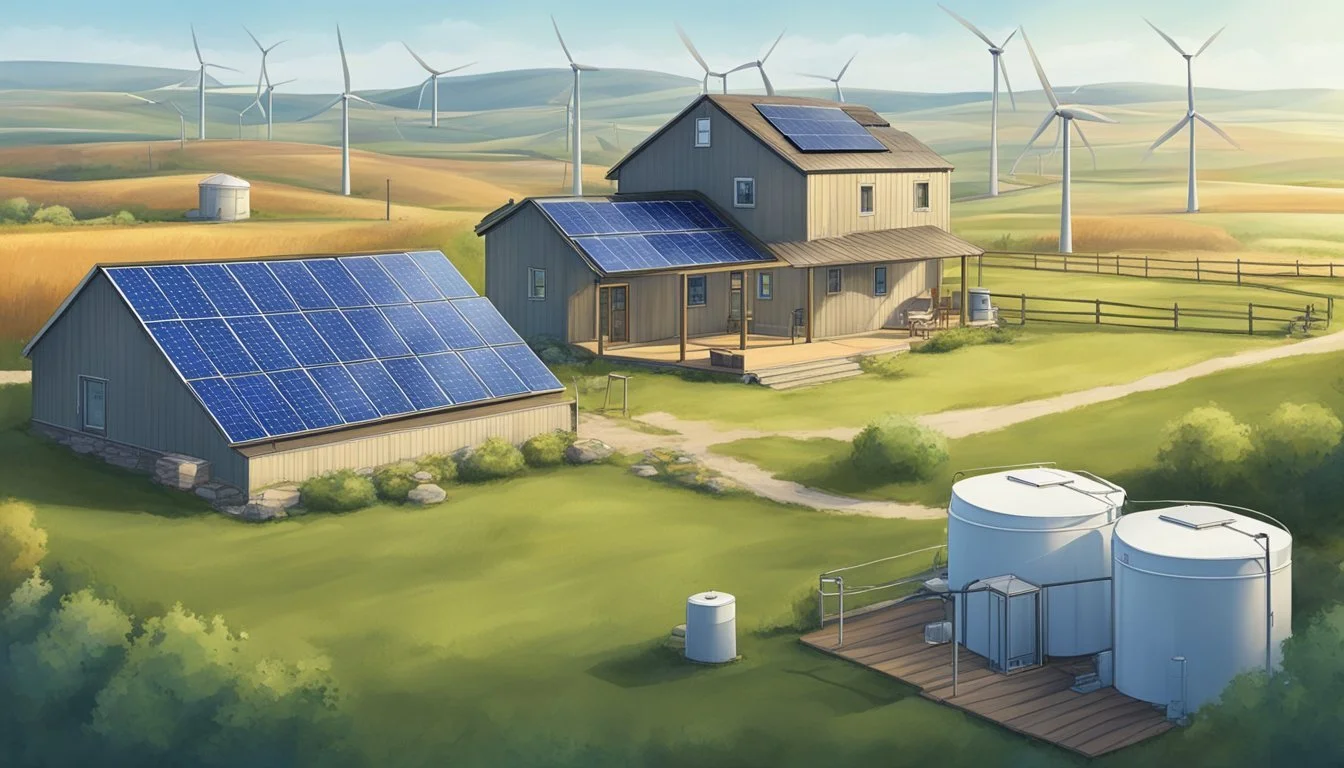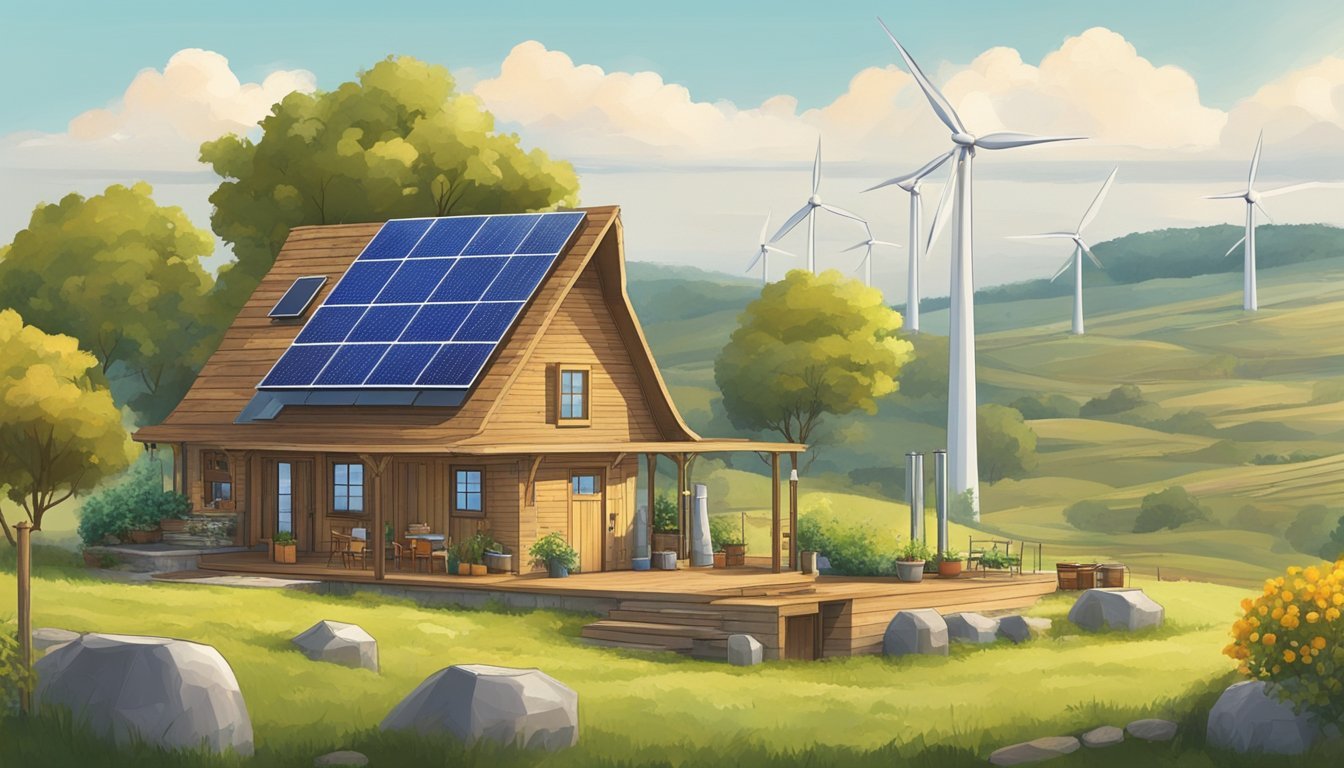How to Live Off Grid in Kansas
A Simple Guide for Sustainable Living
This Article is Part of Our Guide on Living Off-Grid for all 50 US-States
Living off the grid in Kansas provides an attractive opportunity for those seeking a more self-sufficient and sustainable lifestyle. The Sunflower State offers an affordable, environmentally-friendly alternative to traditional living, thanks to its low cost of housing, land prices, and cost of living, which are approximately 40% and 17% lower than the national average, respectively. Additionally, Kansas is known for its wide-open spaces and agricultural landscape, which allows for a more flexible approach to off-grid living.
In rural areas of Kansas, off-grid living is generally legal, and the state's zoning laws and building codes tend to be less strict than in other areas of the country. For example, much of the land in Kansas is zoned as "Agricultural," providing more relaxed rules for those looking to establish a self-sufficient homestead. With an abundance of renewable energy resources such as wind and solar power, Kansas makes it not only possible but also a practical choice for those aiming to live off the grid.
However, it is essential to note that there may be certain legal requirements for off-grid living in Kansas, particularly when it comes to heating and sewage systems. The use of wood-burning stoves, for instance, is subject to specific restrictions and emission standards. Understanding these regulations and potential restrictions is a crucial step in planning a successful off-grid lifestyle in Kansas.
Understanding Kansas' Off-Grid Laws
Kansas is a great choice for off-grid living, with affordable land, relaxed zoning laws, and a lower cost of living compared to the national average. However, there are some legal aspects to consider when planning to live off the grid in Kansas. This section will cover zoning laws and property regulations, as well as the legal aspects of living off the grid.
Zoning Laws and Property Regulations
In Kansas, most of the land is zoned as Agricultural (A-1 or A-2). Zoning rules for Agricultural zones are typically relaxed, making it an attractive option for off-grid enthusiasts. However, it is important to note that some larger towns and cities may have laws requiring connection to municipal sewer systems. These requirements can pose challenges for individuals seeking to live completely off the grid.
Here's a breakdown of some key factors regarding zoning laws and property regulations:
Majority of land zoned as Agricultural (A-1 or A-2)
Relaxed rules in rural areas
Municipal sewer connection requirements in larger towns and cities
Legal Aspects of Living Off the Grid
Living off the grid in Kansas is legal, but there are some factors to consider when choosing this lifestyle. Property tax rates in Kansas are higher than the national average, which could affect your overall cost of living.
However, the cost of land and housing in Kansas is approximately 40% lower than the national average, and the overall cost of living is around 17% lower, making it a viable option for off-grid living.
When seeking to live off-grid, be prepared to navigate local building codes and regulations. Some counties and municipalities may have specific requirements that differ from the state's overall regulations. It is crucial to research and follow the laws in your specific area to avoid potential conflicts with local authorities.
In summary, off-grid living in Kansas is legal, but understanding the zoning laws, property regulations, and navigating the legal aspects of living off-grid are essential steps to ensure success.
Selecting the Right Location
Analyzing Kansas' Geography and Climate
Kansas has diverse geography and climate that offer various opportunities for off-grid living. The eastern part of the state has a humid subtropical climate, while the western part experiences semi-arid steppe conditions. This diversity is optimal for different agricultural pursuits or renewable energy generation. Rainfall varies across the state, with the east receiving more precipitation than the west. Understanding the climatic patterns in different regions can help in selecting the appropriate location for off-grid living, depending on your preferences and off-grid goals.
Assessing Land and Property Availability
Rural areas in Kansas are known for their affordable land and property prices, making it a suitable destination for off-grid living enthusiasts. The property and land cost is approximately 40% lower than the national average. Moreover, the cost of living is about 17% lower than the rest of the country. However, the property tax in Kansas is higher than the national average.
When looking for land or property, it's essential to consider accessibility to resources and potential road access. Pay attention to proximity to water sources, availability of renewable energy options like wind or solar, and access to essential services.
Best Places for Off-Grid Living in Kansas:
Agricultural Zones (A-1 or A-2): Most of the land in Kansas is zoned as "Agricultural" with relaxed zoning rules, perfect for off-grid living.
Rural Areas: Kansas has numerous rural locales that offer lower population densities and larger tracts of land for off-grid living.
Western Kansas: The semi-arid conditions can be suitable for solar energy generation, while also providing an escape from the humid heat found in the eastern regions.
Keep in mind that in larger towns and cities, there may be laws requiring municipal sewer connections, thus restricting complete off-grid living options. Be sure to research local regulations before purchasing land or property to ensure that it complies with your off-grid plans.
Water Resources and Management
Kansas offers various water resources for those seeking to live off the grid. Proper planning and management, along with knowledge of local laws and regulations, can facilitate efficient and sustainable use of water sources. This section will discuss rainwater harvesting and wells, as well as sustainable water rights and usage.
Rainwater Harvesting and Wells
One of the most common methods for obtaining water off-grid is rainwater harvesting. In Kansas, collapsible rainwater barrels can be used to collect rainwater to help with crop irrigation. Rainwater is also suitable for domestic use, such as drinking, cooking, and bathing, after proper filtration and disinfection.
Another sustainable option for water resources in Kansas is groundwater wells. Drilling a well can grant access to an abundant source of fresh water. Proper planning, location, and maintenance of wells are essential for ensuring a continuous supply of clean water. In some areas, groundwater sources might also include natural springs and ponds. It is important to consult local professionals and authorities to ensure adherence with water regulations and guidelines.
Sustainable Water Rights and Usage
When living off-grid in Kansas, understanding water rights is essential for sustainable management of resources. Water rights and usage in Kansas fall under the jurisdiction of the Kansas Department of Agriculture's Division of Water Resources. Regulations governing water rights can be found on their official website. It is crucial to obtain the necessary permits and ensure compliance to avoid fines or penalties.
To minimize the impact on natural ecosystems and maintain a sustainable lifestyle, it's good practice to implement water conservation measures, such as low-flow toilets, water-efficient appliances, and planning irrigation schedules based on local climate and crop needs. Adequate water management is crucial for ensuring a balanced and sustainable off-grid lifestyle for the long-term.
Energy Solutions for Off-Grid Living
In Kansas, living off the grid can be a rewarding experience thanks to the availability of renewable energy resources. This section will focus on energy solutions for off-grid living in the state. We'll explore harnessing solar and wind power, as well as managing off-grid electricity needs to ensure a comfortable and sustainable lifestyle.
Harnessing Solar and Wind Power
Kansas has a favorable climate for both solar and wind energy generation. The state experiences long hours of sunlight, making solar panels a reliable option for producing electricity. Additionally, wind power can be harnessed through wind turbines, which can be especially effective in rural areas with more open land for optimal wind flow.
Solar Power: When setting up solar panels, it is crucial to consider the location, tilt angle, and direction they face. Kansas generally has good sun exposure, giving residents the ability to capture optimal solar energy. Property owners can either select roof-mounted or ground-mounted systems according to their preferences and space availability. It is also essential to maintain the panels by regularly cleaning them and checking for any damage.
Wind Power: Similarly, wind energy can be utilized by integrating wind turbines in areas with consistent wind speeds. Kansas has exceptional wind resources throughout the state, especially in the western and central regions. Off-grid residents can select from various turbine sizes, depending on their energy requirements.
Managing Off-Grid Electricity Needs
To ensure a sustainable off-grid life, it is essential to manage electricity needs efficiently. Here are a few ways to do so:
Energy Efficiency: Utilizing energy-efficient appliances can significantly reduce the overall electricity demand. Selecting LED lights, energy-efficient heating and cooling systems, and Energy Star-rated appliances can optimize electricity usage.
Power Storage: A robust battery storage system helps store surplus energy produced by solar panels or wind turbines. These batteries store electricity when it is abundant and supply it during times of reduced sunlight or wind.
Backup Energy: It is always wise to have a backup energy source, such as a propane generator, in case the renewable resources are not sufficient to meet electricity needs.
Energy Solution Advantages Disadvantages Solar Panels Renewable, low maintenance Weather-dependent, initial cost Wind Turbines Renewable, scalable Noise, space, initial cost Energy Storage Reliable, independent Maintenance, initial cost
Living off the grid in Kansas requires efficient planning and understanding the energy options available. By harnessing solar and wind energy and managing electricity usage, it is possible to achieve a sustainable and comfortable off-grid lifestyle in the Sunflower State.
Building and Developing an Off-Grid Home
Construction Practices and Materials
When building an off-grid home in Kansas, it's important to research local zoning laws and building codes, as they vary across different jurisdictions. Some areas have no building codes and relaxed zoning rules for agricultural zones, while others have stricter regulations on tiny, mobile, and manufactured homes. To build an affordable off-grid dwelling, consider options like used RVs, shipping containers, A-frame homes, and log cabins. For example, A-frame homes can cost as little as $3,500, whereas log cabin kits may range from $25,000 to $50,000.
If you're interested in eco-friendly construction methods, straw bale and rammed earth are alternative building materials that offer excellent insulation and sustainability. Regardless of the chosen material, it's essential to obtain a dwelling permit to create an off-grid homestead legally.
Eco-Friendly Waste Management Systems
Proper waste management is crucial to maintaining a sustainable and healthy off-grid lifestyle. Septic systems and compost toilets are two viable options for off-grid waste management.
Installing a septic system requires adherence to state and local codes, as well as any necessary permits. These systems are designed to treat and dispose of household wastewater using an underground tank and drain field.
On the other hand, compost toilets offer a more environmentally friendly solution for waste disposal. By decomposing solid and liquid waste into compost, they produce a nutrient-rich fertilizer that can be used in gardens or on farmland. While some regions might require permits for compost toilets, they are typically easier to install compared to septic systems.
In conclusion, living off-grid in Kansas requires considering construction materials, building codes, and waste management systems. By carefully planning and incorporating eco-friendly elements, like alternative housing materials and waste disposal options, you can develop a sustainable and comfortable off-grid home.
Sustenance: Food and Agriculture
Growing Crops and Livestock Farming
Kansas is an agriculturally rich state, with a wide variety of suitable crops and livestock options. Some of the primary crops grown in Kansas include wheat, corn, soybeans, and grain sorghum. (how long does sorghum last?) These staple crops are well-suited to the local climate, making them a solid foundation for an off-grid homestead.
To raise livestock effectively, it's important to consider the types of farm animals that are well adapted to the local climate and environment. Commonly raised livestock in Kansas include cattle, sheep, goats, pigs, and poultry. These animals not only provide a source of food but also materials like wool and manure, which can be used for other aspects of off-grid living.
Setting Up Irrigation and Agricultural Systems
Given its climate and topography, an effective irrigation system is essential for off-grid living in Kansas. Rainwater harvesting is a popular way to ensure a consistent supply of water. Collapsible rain barrels can be used to collect rainwater and store it conveniently for watering crops.
For long-term water solutions, you can explore options like constructing a pond or digging a well. Well-drilling permits may be required, so be sure to research local regulations before proceeding.
In addition to irrigation, consider the following steps for setting up your agricultural system:
Determine your agricultural zone: Identifying the climate zone helps in selecting crops and livestock that can thrive in your area.
Soil testing: Performing soil tests will help you identify nutrients and amendments needed for healthy crop growth.
Crop rotation: Implementing a crop rotation system can help maintain soil fertility and prevent the build-up of pests and diseases.
Integration of livestock: Integrating livestock with crop production systems can help with pest control, soil fertility, and diversification of food sources.
Invest in essential farming equipment: Purchase necessary tools and machinery to ensure efficient farming and crop processing.
By incorporating these strategies, you'll be well equipped to grow sustainable food sources for your off-grid homestead in Kansas.
Financial and Practical Considerations
When considering living off-grid in Kansas, it's essential to understand the financial and practical aspects involved in this lifestyle. This section will address calculating costs and savings, as well as understanding taxes and insurance.
Calculating Costs and Savings
The primary expenses associated with living off-grid in Kansas are the cost of land, housing, and utilities, such as solar and wind energy systems, water systems, and sewage disposal. It's crucial to research and compare the cost of living in Kansas to your current location. Be sure to consider the following:
Housing: Investigate the cost of various types of off-grid housing, such as tiny homes, conventional homes with modifications, or custom-built off-grid homes.
Energy: Calculate the investment needed for solar panels, wind turbines, and batteries for energy storage. Keep in mind that Kansas offers incentives and rebates for renewable energy systems, which can help offset the initial costs.
Water: Analyze the costs of implementing rainwater collection systems, drilling wells, and any water filtration or purification systems required.
Sewage: Review options for managing wastewater, such as composting toilets or septic systems, and their associated costs.
Estimate the expenses of these systems and compare them to your current costs, taking into account potential savings from reducing or eliminating monthly utility bills.
Understanding Taxes and Insurance
Living off-grid in Kansas can impact taxes and insurance, so it's essential to understand how the change might affect you financially:
Property Taxes: In Kansas, property taxes can vary depending on your location and the value of your land and improvements. Research the specific rates and assessment methods in the county where you plan to live off-grid.
Insurance: It may be more challenging to obtain insurance coverage for an off-grid home in Kansas. Some insurers may not offer coverage or may have higher premiums due to the perceived risk associated with off-grid living. Speak with multiple insurance providers to compare policies and rates.
Taking the time to research and plan for financial and practical aspects of off-grid living in Kansas will help ensure a successful transition to a sustainable and fulfilling lifestyle.
Community and Lifestyle
Engaging with Local Government and Neighbors
When planning to live off-grid in Kansas, it is essential to engage with the local government and neighbors. In many rural areas of the state, zoning laws and building codes tend to be less strict than in urban regions. However, it is still crucial to research county-specific regulations before embracing off-grid living, especially in larger towns and cities. Some municipalities may have laws requiring connection to municipal sewers, impacting the ability to live entirely off the grid.
It's also crucial to maintain good relationships with neighbors while living off-grid in Kansas. Since many residents in rural areas of the state are already involved in homesteading and other self-sufficient practices, they can offer valuable advice and assistance. Engaging with neighbor's results in a supportive community and an overall better off-grid lifestyle experience.
Adapting to Off-Grid Culture and Society
Living off-grid in Kansas entails adapting to a new culture and society. The cost of housing and land in the state is approximately 40% lower than the national average, and the cost of living is about 17% lower. This makes Kansas an attractive option for off-grid living.
As part of adapting to the off-grid lifestyle, many off-gridders in Kansas participate in, hunting, fishing, and gardening as major sources of food. The wildlife in Kansas is abundant, with deer and coyotes being common across the state. The hunting season in Kansas attracts both locals and visitors, so it's important to be aware of these activities.
For safety in off-grid communities, it's vital to know the local crime rate and take necessary precautions. While rural areas generally have lower crime rates, one should still secure their property and maintain communication with neighbors and local authorities.
In summary, living off-grid in Kansas requires adapting to a different lifestyle, engaging with the local government, and developing strong community ties. By understanding the unique culture and societal norms of Kansas, off-gridders can enjoy a fulfilling and sustainable off-grid lifestyle.




